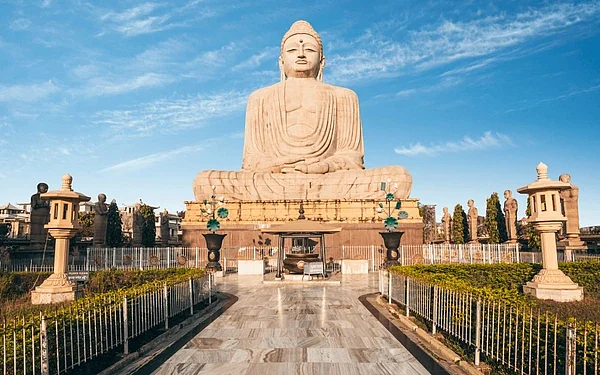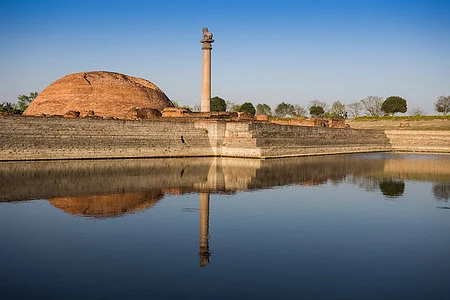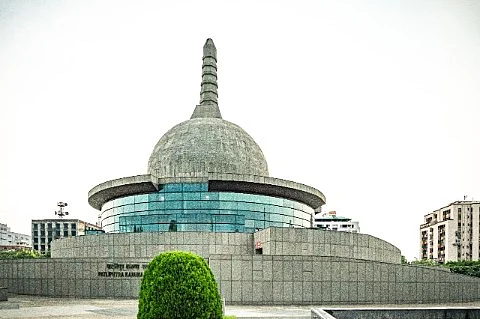Buddhism and Bihar share a deep and intertwined history, dating back over two millennia. Bihar, located in the eastern part of India, is often referred to as the "Land of Buddha" due to its close association with the life and teachings of Siddhartha Gautama. The state is home to some of the most sacred Buddhist sites in the world, making it a pilgrimage destination for millions of Buddhists from around the globe. Buddhism flourished in Bihar during the time of Buddha's life and continued to thrive in the centuries that followed. Here are some of the famous Buddhists pilgrimage sites in Bihar.
Best Buddhist Pilgrimage Sites in Bihar
Explore the sacred Buddhist sites in Bihar, including Bodh Gaya, Nalanda, Rajgir, Vaishali, and more, tracing the footsteps of Buddha through the rich history of the region.

Bodh Gaya

Bodh Gaya, the most sacred site in Buddhism and the place where Siddhartha Gautama attained enlightenment under the Bodhi Tree. This transformative event marked the birth of Buddhism and has made Bodh Gaya a pilgrimage destination of unparalleled importance. The Mahabodhi Temple, built to commemorate Buddha's enlightenment, stands as a symbol of faith and devotion, drawing pilgrims and visitors from all walks of life. The serene atmosphere of Bodh Gaya invites contemplation and reflection, as visitors follow in the footsteps of Buddha on the path to enlightenment.
Nalanda

Nalanda, an ancient center of learning and scholarship that flourished from the 5th to the 12th century CE. It was here that the great Buddhist monastic university of Nalanda stood, attracting scholars and students from across Asia and beyond. Today, Nalanda is home to the Nalanda Archaeological Museum, which houses a rich collection of artifacts and relics excavated from the site. Visitors can explore the ruins of the ancient university and marvel at its architectural splendor, while reflecting on the timeless pursuit of knowledge and wisdom that characterized Nalanda's golden age.
Rajgir

Rajgir, a historic city situated in the south Bihar. It was here that Buddha spent several years in meditation and delivered many important teachings. Rajgir is home to several important Buddhist sites, including the Griddhakuta Hill, where Buddha gave many discourses, and the Vulture's Peak, where he delivered the famous Heart Sutra. The place is also referred to as “Gujjhakut” in Buddhist text. Visitors to Rajgir can also explore the ruins of the ancient city, including the Cyclopean Wall and the Vishwa Shanti Stupa, a symbol of peace and harmony.
Also, a small village near Rajgir, Jethian is among Buddhist pilgrimage sites in Bihar that are Jethian in Bihar of great significance. Also known as the Lativana or the Palm Grove, it is the place where Lord Buddha met King Bimbisara for the first time. In 7th century AD, Jethian became the seat of power of Jayasena, the famous saint. The Chinese pilgrim, Hiuen Tsang spent two years studying Buddhism in India with Jayasena.
Vaishali

Vaishali, an ancient city associated with many events in Buddha's life. It was here that Buddha delivered his last sermon before his final journey to Kushinagar, and it is also where he accepted the hospitality of the courtesan Amrapali. Vaishali is home to several important Buddhist sites, including the Kutagarasala Vihara, where Buddha often stayed during his visits to the city. Visitors to Vaishali can explore these ancient sites and reflect on the legacy of Buddha's teachings.
Patna

Spread over 20 acres, with a theme that reflects the historical relationship between Buddhism and Bihar, Lord Buddha Smriti Park was built to commemorate the 2550 year of Lord Buddha's Mahaparinirvana. Located near Patna Railway Junction, apart from two saplings of sacred Bodhi tree from Bodh Gaya and Anuradhapura, the park houses a relic Stupa, Bodhi Tree, and a meditation center. Another, Kumhrar Park, located about 5 Km away from the main city, is the epitome of the cultural brilliance of ancient Patna. Archaeological findings in this area establish Patna's claim to over a thousand years of political glory dating back to the great Mauryan civilization. Excavation at Kumhrar has unearthed a rich collection of relics such as ornaments, terracotta beads, copper coins, utensils etc. Further excavations have unraveled A Buddhist monastery built of brick, an ancient medical clinic, and a Durakhi Devi Temple.
Jehanabad
.jpg?w=295&auto=format%2Ccompress&fit=max&format=webp&dpr=1.0)
Located 35 kilometers from Patna, the district of Jehanabad is another major tourist site related to Buddhism. It houses five rock-cut, polished caves built by Emperor Ashoka for the Buddhist monks. The Barabar Hill Caves are the oldest surviving rock-cut caves in India, dating from the Maurya Empire (322-185 BCE), some with Ashokan inscriptions, located in the Makhdumpur region of Jehanabad district. Situated in the twin hills of Barabar and Nagarjuni, these caves were carved by the Mauryan emperors, Ashoka and his grandson, Dasharatha Maurya, to serve as residence for Buddhist as well as Jain monks.
East Champaran

East Champaran, fondly called the land of Lord Buddha, occupies a coveted position among international Buddhist destinations. According to Buddhist scriptures, when Prince Siddharta started off on his path to enlightenment, he stayed for a while at the ashram of Alara Kalama, who is said to have been his first teacher, at Lauriya Areraj. The world famous Kesaria Stupa, the tallest Buddhist Stupa, is situated here.
The lofty stone pillar, known as the "Stambh dharma lekh" is located at Motihari main road. As per popular belief, this pillar was constructed by emperor Ashoka to commemorate Lord Buddha's first steps towards enlightenment at the ashram of Saint Alara Kalama. This Ashokan Pillar is 37 feet tall with a base diameter of 11 feet, 2 inches. At the top the diameter measures 8 feet.
The Buddhist sites in Bihar offer a unique opportunity for pilgrims and visitors to connect with the spirit of Buddha and experience the transformative power of his teachings. From the place of his enlightenment in Bodh Gaya to the sites of Vaishali, from the ancient seat of learning in Nalanda to the historic city of Rajgir and the land of his disciples in Vaishali, each stop on this journey is imbued with a sense of reverence and awe. So why wait? Pack your bags, embark on a journey of enlightenment, and trace the footsteps of Buddha through the timeless landscape of Bihar.














.png?w=200&auto=format%2Ccompress&fit=max)
.png?w=200&auto=format%2Ccompress&fit=max)




